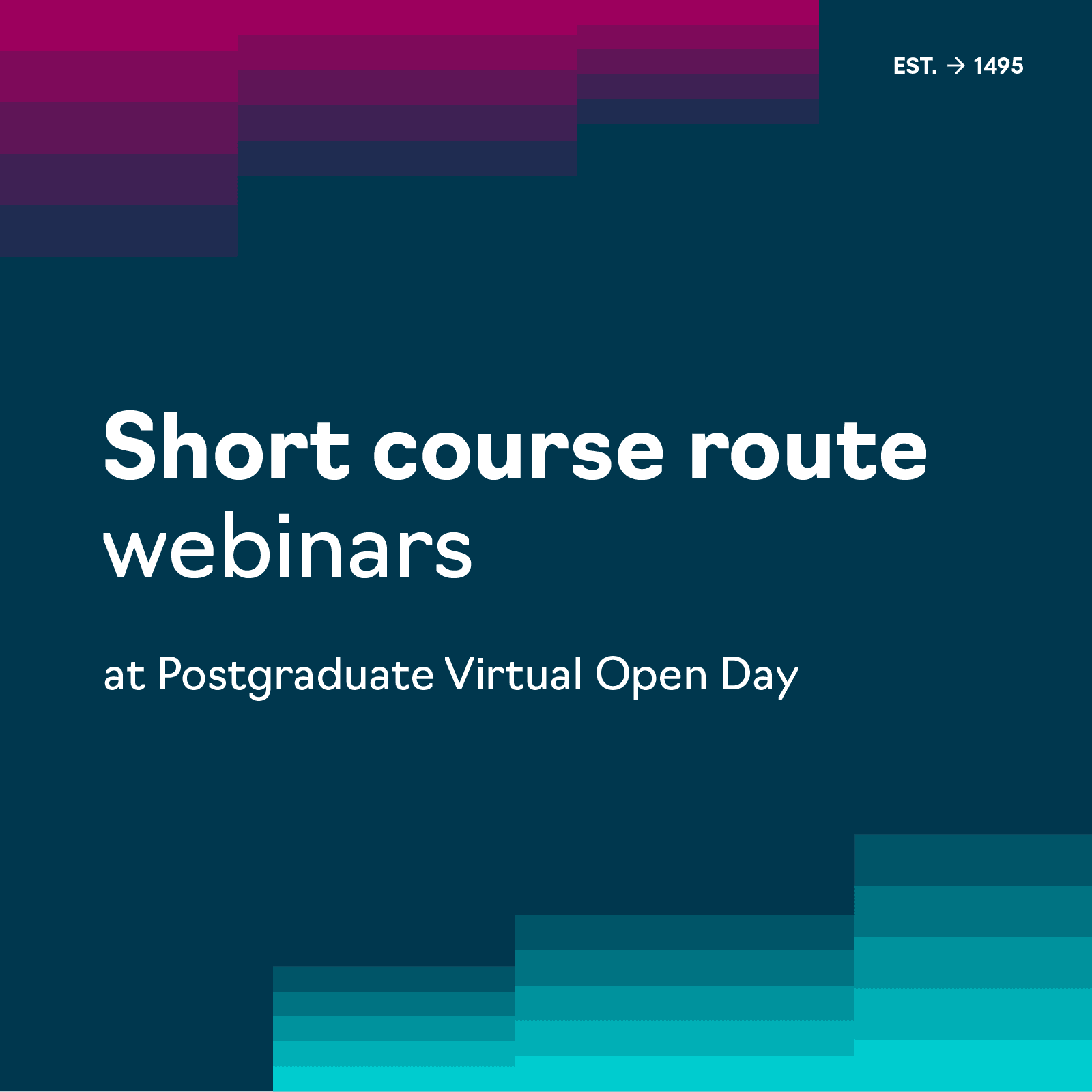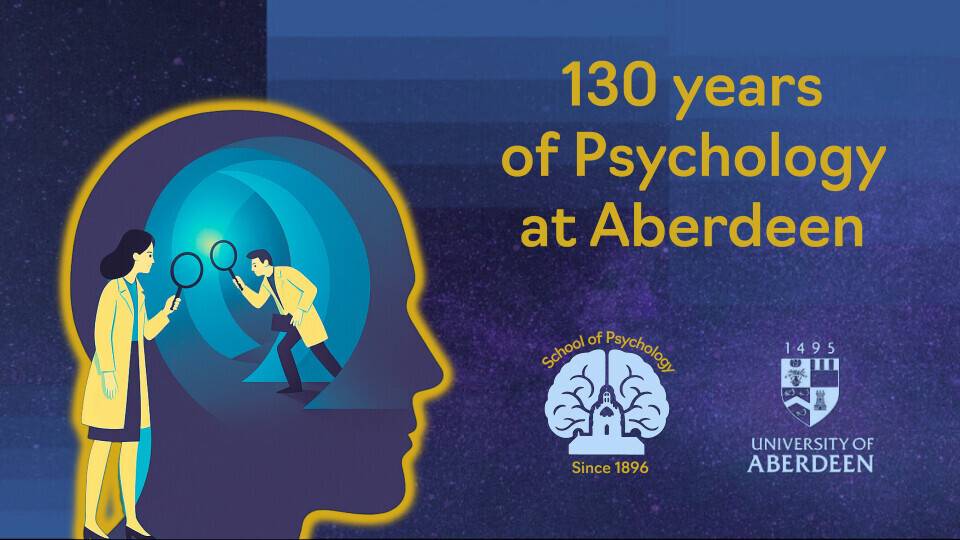
Join our short course route webinar
Interested in taking the short course route to a Masters or postgraduate qualification?
Join our online Postgraduate Virtual Open Day on Thursday 12 March.
We’ll be hosting two live webinars there, explaining how the short course route works and answering all your questions. See you there!
- Morning webinar: 10.50am (GMT)
- Evening webinar: 5.50pm (GMT)
Study the psychological science behind wellbeing and mental health.
What makes us happy? What improves our psychological wellbeing? How can we increase life satisfaction?
Join our online psychology of wellbeing course and gain a psychological understanding of emotions, behaviour, and mental health.
With expert guidance from clinical psychologists, you’ll:
- explore the science and theory of what improves psychological wellbeing
- learn how to improve your own mental wellbeing
- discover ways we can apply psychological research to improve the wellbeing of communities and societies.
Who can join this psychology of wellbeing course?
This Masters-level online short course is designed for anyone with an interest in psychological wellbeing.
It may be of particular interest to those working in community settings.

Build credits towards postgraduate qualifications
This short course is part of:
- PgDip Human Factors and Safety (online)
- PgDip Psychology in the Workplace (online)
- MSc Psychological Studies (on campus)
You can use the credits you earn with this short course towards these postgraduate qualifications.
What you’ll study
In this online course, you’ll study the evidence base of psychological research around wellbeing.
You’ll discover how psychological theory and research can be applied to improve the lives of individuals, communities and societies.
You’ll explore:
- what is meant by wellbeing, the different approaches to this and how it can be measured
- what psychological science tells us about improving individual wellbeing
- applying science to improve individual wellbeing and the barriers to implementing this
- the wider systemic and cultural factors contributing to wellbeing in communities and societies.
You’ll learn to understand and apply research findings in your own life and in communities to improve psychological wellbeing and mental health.
You’ll cover topics including:
- Emotions
- Thinking
- Brain biases
- Beliefs
- Changing behaviour
- Building new habits
- Achieving goals.
By the end of this psychological wellbeing course, you’ll be able to…
-
Describe theories of psychological wellbeing.
-
Critically evaluate psychological research on factors contributing to psychological wellbeing.
-
Reflect on opportunities and barriers to applying research in real-life settings.
-
Apply an understanding of the evidence to individuals and in your own life.

130 years of psychology at Aberdeen
The School of Psychology at the University of Aberdeen is the oldest psychology department in the UK.
You’ll be studying with a university that has been pioneering psychological research and training professionals in the field for over a century.
Choose the University of Aberdeen for psychological wellbeing courses

Fits around full-time work
This online course fits around work, with flexible hours and 24/7 study access.

You’re in expert hands
Founded in 1495, we’re an ancient UK university that’s been delivering online learning for decades.

NHS and alumni discounts
NHS staff get 10% off this online course. University of Aberdeen alumni get 20% off.
How you’ll study
Online learning
This distance-learning psychology of wellbeing course is delivered flexibly, 100% online.
You can study with us anywhere in the world, no student visa required, and manage your study hours to suit you.
Your teaching
This course is taught at Masters level.
Teaching is delivered through MyAberdeen, our online Virtual Learning Environment (VLE). It holds all the materials, tools and support you’ll need in your studies. Take a look around MyAberdeen.
You can access your learning materials on computer, smartphone and laptop, 24 hours a day. You’ll find a range of resources available, including:
- videos
- reading materials
- discussion boards with your tutors and peers
- the online resources of our award-winning Sir Duncan Rice Library.
Your tutors
This online short course is delivered by our School of Psychology.
You’ll learn from practising clinical psychologists who have extensive experience of clinical psychology in practice and in teaching at postgraduate level.
This course is assessed online.
You’ll be assessed throughout your studies via:
- online multiple-choice tests.
These will test your knowledge of each of the main topics covered by the course.
Course duration
The September run of this course is 10 weeks long.
The January run of this course is 13 weeks long – it contains the same 10 weeks of teaching, but includes a three-week spring holiday.
Study hours
The course totals approximately 150 hours of study and assessment time. That’s around 10 – 15 hours per week.
This is an indicative guide to the time required for a typical student at this level to achieve the learning outcomes. This includes time for independent study, as well as teaching and assessments.
You can largely set your own study hours each week to cover the materials. MyAberdeen is available 24/7, so you can log in and study when it suits you.
Activities at fixed times
There may be some activities scheduled for fixed times. This could include coursework and assessments with deadlines, or online meetings with your tutor. Otherwise, you can access and work through the course at your convenience.
Our first-class support structure will ensure that you aren’t alone in your studies.
You’ll have contact with your coordinator via email, MyAberdeen, Microsoft Teams, or phone. You can use social media and discussion boards to chat with your fellow students too.
We provide a wide range of services to support you in your studies and beyond:
- Careers and Employability Service
- Disability support
- IT support
- Library support
- Student Support Service – help with finances, wellbeing and non-academic issues
- Student Learning Service – study support, with advice sessions available
- Aberdeen University Students’ Association (AUSA) – run by students for students
- Toolkit – clever apps and free training that can make your study life easier
Wherever you are in the world, you’ll feel part of our very special Aberdeen learning community.
Your teaching team

Professor Jason Bohan
Jason is the Director of Teaching and Learning in our School of Psychology and is overseeing this course.
He has a wealth of experience in teaching and pedagogical matters and is Chair of The British Psychological Society’s (BPS) Scottish Branch.
View Jason’s profile
Dr Emma Hepburn
Emma is an Honorary Lecturer who teaches clinical psychology at undergraduate and postgraduate level.
She has been practising as a Clinical Psychologist for over 10 years and works for NHS Grampian.
Emma is also well known as The Psychology Mum for her psychology illustration work.
Where this will take you
Towards postgraduate qualifications
You’ll earn 15 credits at Masters level (SCQF Level 11) with this course. You can use these credits towards:

PgDip Human Factors and Safety
Earn human factors certification online. Study flexibly with expert psychologists and and learn to make workplaces safer.
View PgDip Human Factors and Safety
PgDip Psychology in the Workplace
Explore occupational psychology online with UK university psychologists. Choose from a range of online workplace psychology courses and build a graduate qualification tailored to you.
View PgDip Psychology in the Workplace
Accredited Masters in Psychological Studies (on campus)
A full-time, on-campus MSc programme accredited by The British Psychological Society (BPS).
This conversion MSc is designed to introduce graduates from other disciplines to the study of psychology, as a first step to pursuing a career in this area.
View MSc Psychological StudiesBuild your learning
This course is part of our series of online mental health and wellbeing courses.
Use these short courses to build your skills and earn more credits towards postgraduate psychology qualifications:
- Mental Health and Wellbeing in the Workplace
- The Psychology of Equality, Diversity and Inclusion at Work
- The Psychology of Social Bias
- View all online psychology courses.
All these flexible courses are part-time and fit around full-time work.
Careers
Whatever your industry, you’ll gain career-enhancing skills and expertise on this course.
Continuing Professional Development (CPD)
Your employer or professional institute may recognise this course for CPD hours. Talk to your employer or institute to find out more.

Free career support
Access our free careers service while you study.
- 1:1 appointments
- CV checks
- Interview prep
- Job opportunities
What our students say
Hear from recent students studying The Psychology of Wellbeing online.
Leonie, Psychology of Wellbeing student (2025), Flight Attendant
“I really enjoyed the course, the format, and the flexibility it provided.
“Even if I was in a different time zone I had plenty of time to complete my workload and was never penalised for it.
“I’m glad I did it, and I hope I’ll take more online courses with Aberdeen.”
Entry requirements
Entry requirements
We welcome students from all over the world.
This course has no formal entry requirements. You do not need to provide proof of your qualifications.
But you do need to check the entry guidance above to understand the level of teaching delivered, to decide if this course is right for you.
If you do not have qualifications from the UK, check the equivalent teaching level for your country.
Visa requirements
You do not need a student visa to study online with us.
English language requirements
Teaching is delivered in English.
You do not have to provide proof of your English language skills to join this course. But we want to make sure that you can use English well enough to study successfully.
Recommended level of English
For this course, we recommend the following level of English language proficiency.
These are our Postgraduate Standard requirements, and these are minimum scores.
IELTS Academic, IELTS UKVI Academic, or IELTS Online (not IELTS Indicator or IELTS General Training)
- 6.5 overall
- 5.5 for listening, reading and speaking
- 6.0 for writing
TOEFL iBT or TOEFL iBT Home Edition
- 90 overall
- 17 for listening
- 18 for reading
- 20 for speaking
- 21 for writing
- TOEFL DI code is 0818
Cambridge English: B2 First, C1 Advanced, or C2 Proficiency
- 176 overall
- 162 for listening, reading and speaking
- 169 for writing
LanguageCert Academic / LanguageCert Academic SELT
- 70 overall
- 60 for listening, reading and speaking
- 65 for writing
Oxford ELLT Digital – English Language Level Test Online
- 7.0 overall
- 5.0 for listening, reading and speaking
- 6.0 for writing
PTE Academic (online test not accepted)
- 62 overall
- 59 for listening, reading, speaking and writing
Skills for English: SELT
- B2 pass with merit
Duolingo – tests taken from 1 July 2024 onward
- 120 overall
- 95 for listening, reading and speaking
- 105 for writing
University of Aberdeen English Pre-sessional Programme (PSE)
- Pass
- Valid for one year. Refresher can be offered if out of date
Pre-sessional academic English preparation programmes undertaken at other UK universities
- Pass at an equivalent of 6.5 (C1)
- B2 in all four skills
- Certification must be within one year prior to the start of your course
For full information about language requirements, see our English Language Requirements page.
You will need access to:
A computer (PC, laptop or Mac) with an up-to-date operating system
Most teaching materials are smartphone- and tablet-friendly. But we recommend a proper laptop or desktop for completing assignments comfortably.
Reliable internet access
We recommend:
- a wired connection
- a minimum download speed of 2 Mbps so you can take part fully in live sessions.
Speakers or headphones
- We recommend a headset with built-in microphone and earphones if you’re likely to study in an environment with background noise.
- A webcam is optional, but you may like to use one for some interactive sessions.
Software
We’ll give you access to Office365 applications. This means you can use online versions of Microsoft Word, Excel, PowerPoint and OneDrive and install these programs on up to five personal devices.
If your course requires specialist software, we’ll provide you with access to this and a licence that lasts throughout your studies.
See our detailed IT requirements for more information.
When you study with us, you can expect a first-class support structure so that you’re never alone in your studies.
But learning online does mean you have to motivate yourself and manage your own time.
Your most important commitment will be time – the time to work through, reflect on and understand your teaching materials.
Before you start a course that involves a high degree of independent study, we recommend looking at the time you will be able to devote to your studies each week:
- Be realistic
- Create a weekly schedule as a guide
If you have any questions about studying online, get in touch with our friendly team. We’re here to help.
Fee payment
Your course fee needs to be paid in full before you start your course.
We accept payment via Visa Debit, Visa Credit and Mastercard.
Ways to save
You may be able to get help funding this course via:
- discounts – if any discounts are available for this course, they’ll appear in the section below
- employer sponsorship – we accept full and partial fee payments from sponsors.
Find out more about funding options.
Student card
All our students are entitled to a University of Aberdeen student card. This gives you access to a range of student discounts around the city and online.
Learning resources
Access to all the essential books and resources you need are included in your tuition fee. They’ll be made available to you online and you do not have to buy your own copies.
We also provide optional recommended reading lists. Many of these resources are available electronically through our library, although purchases may be required if you wish to read the full list.
Printing
You may want to set aside a small budget for printing, depending on how you like to work.
This course has no formal entry requirements. You decide if it’s suitable for you.
The course is delivered at Masters level. At this level, you’d usually have at least:
- a 2:2 UK undergraduate degree (or equivalent), or
- relevant experience that supports this level of study.














